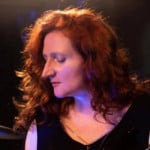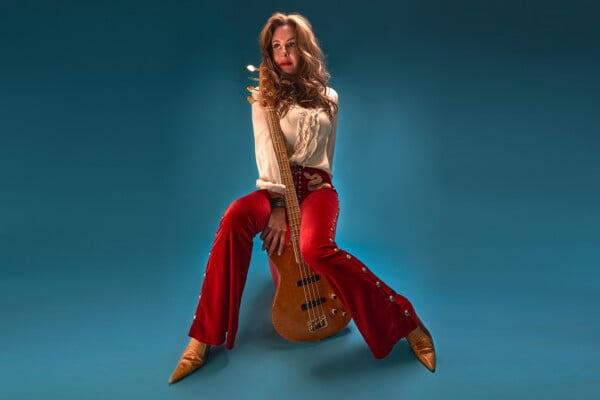Wonder Women: Angeline Saris – Part 1
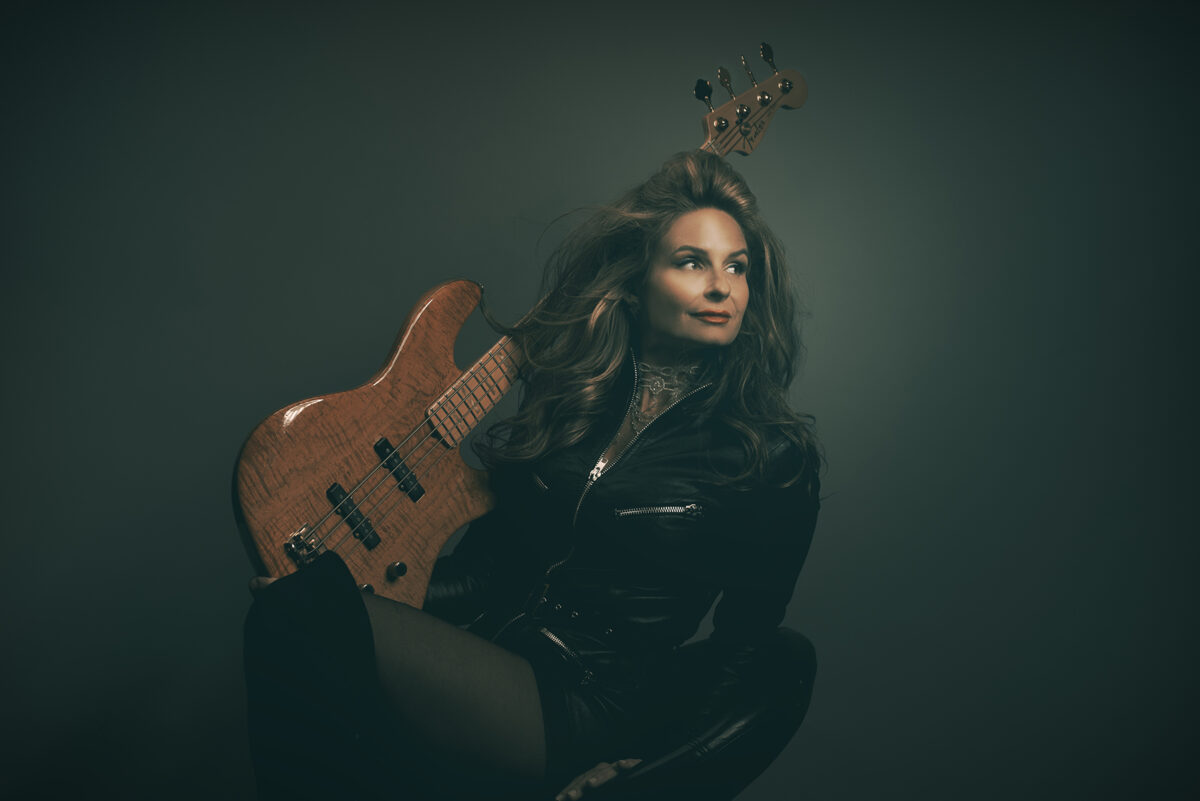
In this month’s installment of Wonder Women: Stories From the Women Who Play Bass, we’re catching up with Angeline Saris, fresh off a six-week run with the Celebrating David Bowie tour. Following the tour (and while still managing to get in a studio session), she graciously fit in the time for this interview.
With an arresting combination of versatility, focus, taste, and chops, Saris is a seasoned professional and compelling performer. Her jazz background shines through in her melodic lines; her rock leanings mean she isn’t afraid to lay down a solid, heavy grove, and her chops allow her to burn when the moment asks for energy. Whatever the song calls for, that is what she honors. Fluent on four and 5-string basses, electric-upright, and a quick read on charts, Saris spends much of her time in the studio when not on the road.
“I’d say it’s my versatility that has put me in a position to be considered for a variety of gigs. When I first started out, I spent a lot of my career saying yes to just about anything for the sake of learning and because I found the challenge fun and interesting. I grew up playing bass in the jazz band in high school, and learning how to craft walking bass lines made for an excellent foundation for moving between genres with ease. When I am out with Narada, a typical set will include some odd-time Mahavishnu Orchestra, some Hendrix, a few Whitney Houston tunes, a few Aretha tunes, some of Narada’s original fusion or pop stuff, and maybe some stanky Larry Graham or George Duke inspired funk. It’s all over the map, and I love that!”
While her musical resume covers a lot of ground, at the core, Saris’s natural inclinations reside in rock, pop, R&B, and soul music, which is evident through her songwriting as ANGELEX. Teaming up with drummer Lex Razon and enlisting some of the Bay Area’s finest musicians, Saris showed the world her voice as a songwriter with ANGELEX’s 2018 debut release of Tight Lips. The album met rave reviews, and as Bass Player Magazine stated, “Her vibe on the album is that of a musician finally creating her own musical identity, after years of playing other people’s material–and it’s a sound that suits her well.” Beyond ANGELEX, Saris has also composed music for the esteemed Paufve Dance Company and is currently in the studio wrapping up work on her highly anticipated solo album.
“I have some friends who feel completely fulfilled being a hired gun and have no desire to write their own material. That is definitely not me. I am equally both hired gun and an artist. I absolutely love my work as a hired gun and will always want that to be a very large part of my career. That being said, I have songs that live in me and a desire to hear them come to life. When I recorded “Top Down” for my Angelex record, it was a really fulfilling moment to see this idea that literally just poured out of me one morning come to life. I have a vision for the future of my own art, and I hope to carve out more time to cultivate that vision.”
Who were your influences?
I spent my high school years listening to Rage Against the Machine, Zeppelin, RHCP,
Herbie Hancock and the Headhunters, Freddie Hubbard, Janis Joplin & Big Brother, Chaka Khan, Beastie Boys, Beck… It really could not be more all over the place. As far as bass players…James Jamerson, Pino Palladino, Larry Graham, Meshell Ndegeocello, John Paul Jones, Paul Jackson, Jaco Pastorious, Ray Brown, and Adam Yauch…to name a very small slice of inspiration. I’m sure I’m leaving out some pivotal names, but this is a solid representation of what makes me tick.
For me, good music supersedes the boundaries of genre.
An early experience that shaped you as an artist now?
Like a lot of people, I had some tough moments growing up that scarred me more than I realized. I went through a period where I used to sit and listen to NIN or Miles’ Kind of Blue and paint. Looking back, my brain and my heart were trying to make sense of things. I know music was a beautiful refuge for me, too. When you put that anger into a riff blasting through an 810 stack, it becomes power. Or, when you take your sadness and write a sweet melody, it somehow becomes beautiful. You give it all up to the music. Playing music is emotional alchemy.
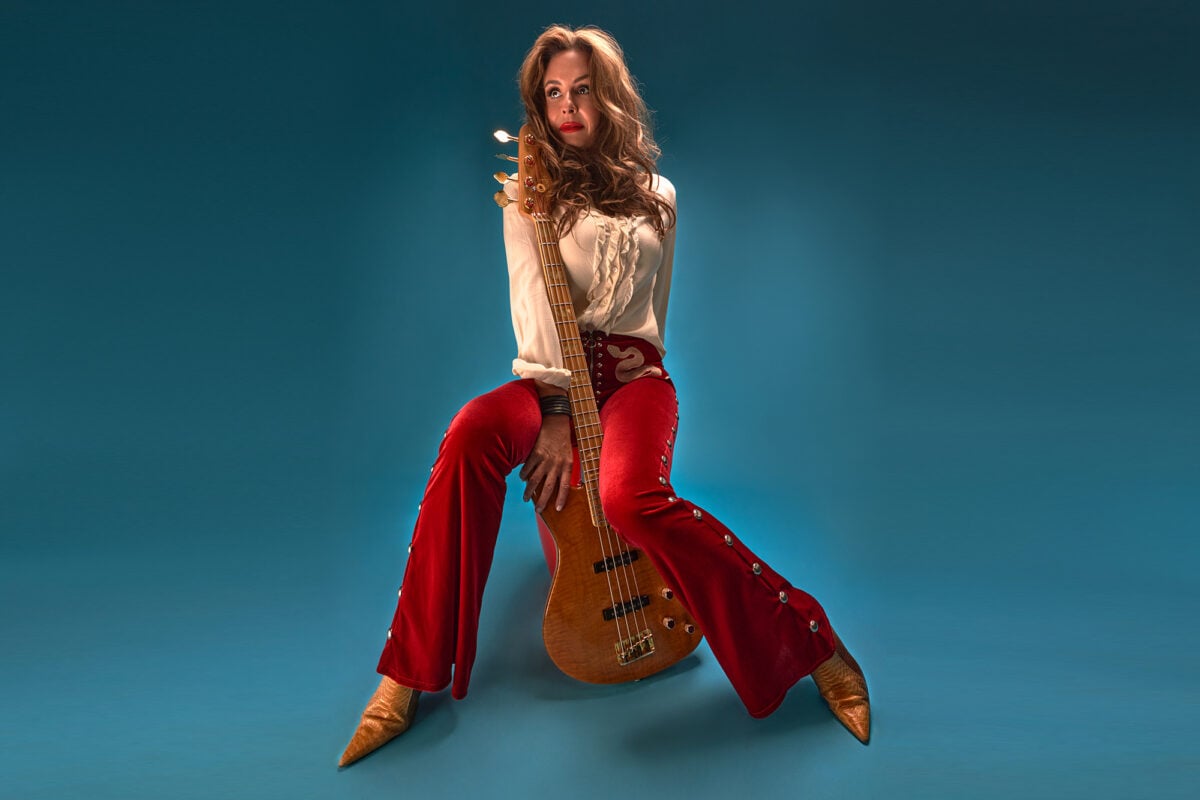
Do you have a dream artist or band you’d love to collaborate with?
I gravitate towards heavy grooves that rock. If you stick me in something that sounds like Rage, Zeppelin, Beastie Boys, Muse, or some of the heavier Mahavishnu, like Eternity’s Breath Part 1, I’m pretty much in heaven. Jack White’s performance of “Lazaretto” and “Ball and a Biscuit” on SNL blew my mind. Plus, with Daru Jones on drums, I was freaking out. My seven years playing Zeppelin with Zepparella and my decade with the Narada Michael Walden band playing Hendrix and Mahavishnu embedded that music into my soul. Those JPJ vibes live strong inside of me and flavor my playing so much. If Dominic John Davis ever wanted a break (haha), I’d drop everything.
What are you woodshedding right now?
The biggest thing I’ve been working on is my 1/16th note double-thumbing technique with string skips. I wrote some new original music earlier this year that is about 80% done and recorded, with the exception of my final bass track. I heard this bass part in my head, but I don’t quite have the technique yet to execute it, so I need some time in the shed. I just got off the road, so I can devote my mental energy to that right now. It feels great to have focused practice time and just zen out of the pocket.
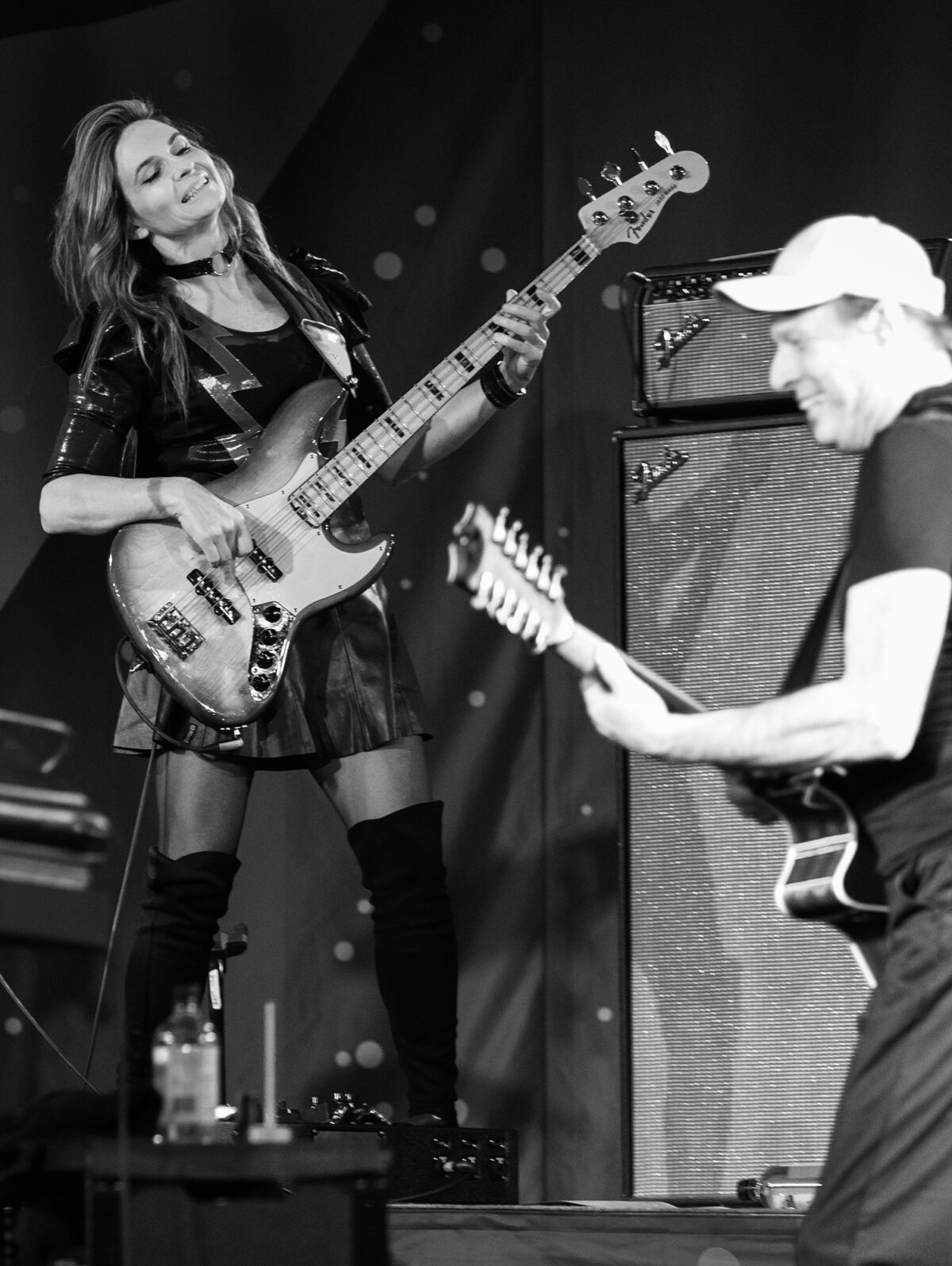
The other thing I’ve been totally saturated in these last few months is the bass lines of David Bowie. I just came off a six-week run with Celebrating David Bowie featuring Rock’n’Roll Hall Of Famer Todd Rundgren, Adrian Belew (Bowie, NIN, King Crimson, Frank Zappa, Talking Heads), guitarist Scrote, Spacehog’s Royston Langdon, Fishbone’s Angelo Moore, solo artist Jeffrey Gaines, saxophone great Ron Dziubla (Jon Batiste, Joe Bonamassa), and drummer Travis McNabb (Sugarland, Better Than Ezra). For the first week of rehearsals, I had around 35 songs I had learned, and we added even more along the way for special guests who joined us, like Thomas Dolby, Jeffrey Gaines, and Ava Cherry. It was a lot of material, and I really wanted to honor the original parts for this first run. For me, that meant learning the recorded bass parts from the studio version and then comparing them to how they were performed and played throughout the years by Bowie’s subsequent bassists. It was fascinating to learn the nuances of each player’s style. I feel like I have a much more intimate understanding of Trevor Bolder, George Murray, Herbie Flowers, Carmine Rojas, and Gail Ann Dorsey – just to name a few. I’m a bit of a nerd, so I have a document that lists each song, the bass player who played on the studio recording, the album it’s from, and the other players on the track. In some cases where I could find it, I also have notes about what kind of gear they were using. It was a lot to keep track of in the beginning, so having a reference document helped. Sinking my teeth into this catalog has been a huge part of my woodshed routine and a pretty special opportunity to study bass playing for one of the most unique artists to have lived.
We usually hear about the downsides of being a female in the music industry. Let’s flip the script; do you see any benefits?
Empowering other women is one of the most rewarding parts of working as a female bass player in the music industry. After our last Celebrating David Bowie show in Phoenix, Michele Rundgren, Todd’s wife, came up to me backstage and encouraged me to find ways to shine even brighter in my role. She said, “Hey, you’re representing all of us out there.” And as the only female on stage working with a team of 14 men, I was. I so appreciated her words of encouragement and support. And I am able to pass that on. Without fail, there are always a few women after any show, and sometimes men too, who come up and thank me and tell me how inspiring it is to see a woman on stage rocking the bass. That means the world to me. While we’re seeing more women in the industry than ever, it’s still not the norm by any means.
It’s important to add there is a big picture thing here, too – and music is a small piece of that. Whether it’s a CEO of a tech company (10%), being allowed to compete in a big wave surf competition (look up Bianca Valenti), or being president (still holding out), women deeply want and deserve to participate in male-dominated industries. While we’ve made some strides in America, women all over the world are still fighting against oppressive laws that prevent them from educating themselves, voting, choosing their own husbands, or even singing in public. The situation in Iran right now is a great example of the bigger picture; women are fighting for what we consider basic freedoms in America, and many are dying. These are freedoms that their male counterparts have been granted without question. So, however small it may be, women in music are a part of that. We still have a long way to go on planet Earth, but the more we see women participating in activities that are generally performed by men, the more it will become normalized. This will pave the way for women to thrive even more. We are just getting started here.
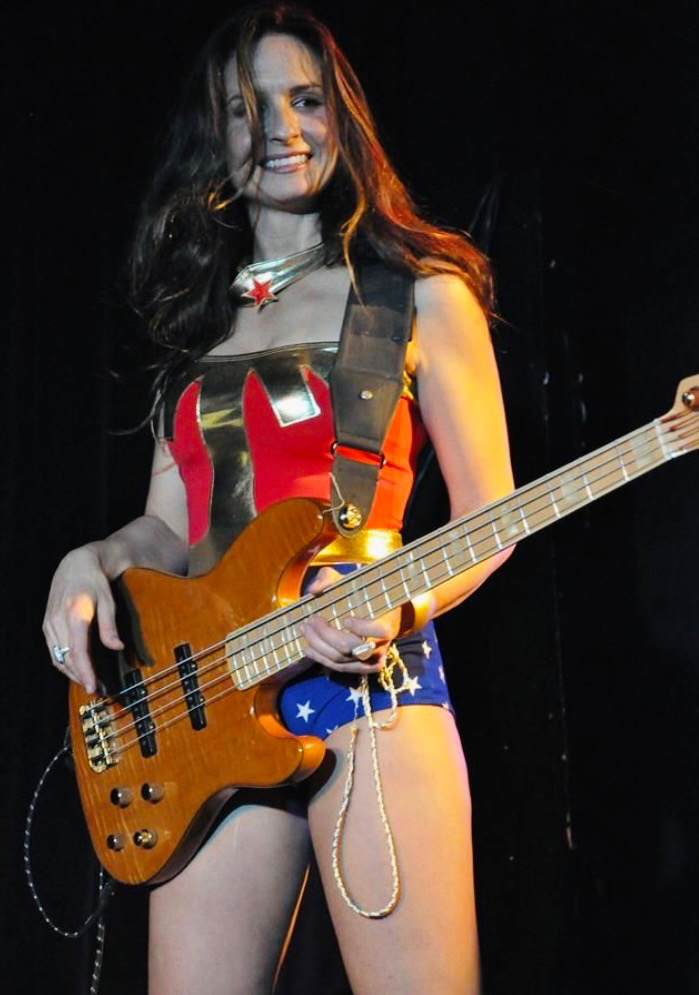
How have you handled work through the pandemic? How has technology helped (or hindered) you? Any tips to share?
For me, the pandemic was not a time of slowing down at all. I ended up teaching an online course in audio production for a year. I got to design the entire course from scratch and basically guide two classes through setting up a home studio and using Ableton to write and record. I also had to learn how to use the Canvas LMS, which is a great tool to have under my belt since many universities like Berklee use that for their online courses. It was a ton of work, and I’ll admit there were tears of frustration shed at various points. While I was thankful to lean on my teaching practice during the pandemic, I really missed the energy of the stage. I found online performances that tried to recreate the stage experience remotely to be more frustrating than fun, with the exception of working with Matt Butler’s project, The Everyone Orchestra. Matt is a genius, and his process is unlike anything I’ve ever seen before. For the performance I participated in, he assembled a crew of musicians that included Adryon De Leon (Orgone), Steve Kimock, Johnny Kimock, DJ Williams (Karl Denson’s Tiny Universe), Steve Berlin (Los Lobos), and AC Carter (Tauk). Beforehand, the only thing he gave us was a blueprint of the chord changes for each section. We then each recorded our improvised parts to a video of him conducting and holding up signs cueing different sections. The real kicker is we recorded our parts without hearing anyone else’s, so when the concert aired to the public, it was also our first time hearing it all together. It was a treat to work with this crew, and it was especially fun to hear the music we created collaboratively using technology to sidestep the constrictions of the pandemic.
What was the first instrument you learned how to play?
My first instrument was actually the steelpan in 6th grade. Funny enough, they assigned me to the bass drum part of the ensemble, which entails being surrounded by a horseshoe shape of six garbage can-sized drums, each with three notes on them. I remember loving it. That may have been my first bass gig – ha!
Any artists, both established or emerging, that is new to you that you would like to tell us about?
I saw Yusef Dayes with Rocco Palladino on bass earlier this year, and it totally blew my mind. Do yourself a favor and go see this project if they are in town! I also just got hip to Lowrider, which scratches that heavy groove itch for me. Lastly – and I think I may be a little late to the party on this one – but I just heard of Teddy Swims in October. What a voice! Really digging his overall musical vibe.
Any current projects that you can tell us about?
I’m really excited to say I have a lot of original music coming out in 2023, starting with a new single in January. More details on that soon!
Find Saris online: website, Instagram, Facebook, Youtube, and Bandcamp.
Stay tuned for part 2 of this interview… coming in January!
Brittany Frompovich is a highly regarded educator, clinician, blogger, and bassist who currently resides in the Washington DC/NOVA region. For more content from Brittany, check out her blog, her YouTube channel, and her Bandcamp site. She also offers handmade unisex music-themed jewelry through her Etsy store. Get a Wonder Woman Tee!
